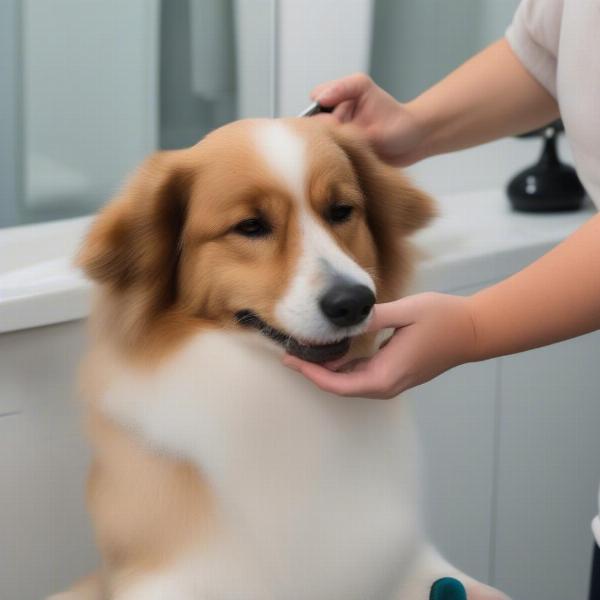Skin care is crucial for a dog’s overall health and well-being. Healthy skin not only looks good but also protects against infection, parasites, and environmental irritants. This comprehensive guide will cover everything you need to know about maintaining your canine companion’s skin health, from choosing the right shampoo to recognizing signs of skin problems.
Understanding Your Dog’s Skin
Just like humans, dogs have different skin types. Some breeds are prone to dryness, while others may be more susceptible to oiliness or allergies. Understanding your dog’s specific needs is the first step towards effective skin care. Factors such as breed, age, environment, and diet can all influence skin health.
Common Skin Problems in Dogs
Recognizing the signs of skin problems is essential for early intervention and treatment. Common issues include:
- Dry, flaky skin: This can be caused by low humidity, allergies, or underlying health conditions.
- Excessive itching and scratching: Often a sign of allergies, parasites, or infections.
- Hot spots: Moist, inflamed areas of skin that can develop quickly due to excessive licking or scratching.
- Hair loss: Can be localized or widespread and may indicate a variety of issues, from allergies to hormonal imbalances.
Bathing Your Dog: Tips and Tricks
Bathing is a key component of dog skin care, but it’s important to do it correctly. Over-bathing can strip the skin of its natural oils, leading to dryness and irritation.
Choosing the Right Shampoo
Using a dog-specific shampoo is crucial. Human shampoos have a different pH balance and can disrupt the delicate ecosystem of a dog’s skin. Look for shampoos formulated for your dog’s specific skin type, whether it’s dry, oily, or sensitive.
Bathing Frequency
The frequency of bathing depends on your dog’s breed, lifestyle, and individual needs. Generally, most dogs benefit from a bath every 4-8 weeks. However, dogs with skin conditions may require more frequent bathing with medicated shampoos.
Nutrition and Skin Health
Diet plays a crucial role in skin health. A balanced diet rich in essential fatty acids, vitamins, and minerals can support healthy skin and coat.
Essential Fatty Acids
Omega-3 and omega-6 fatty acids are crucial for maintaining skin integrity and reducing inflammation. These can be supplemented through fish oil or other dietary sources.
Food Allergies
Food allergies can manifest as skin problems, including itching, redness, and hair loss. If you suspect a food allergy, consult with your veterinarian to identify the trigger and implement an elimination diet. best wet food for older dogs can be a good resource for senior dogs with sensitive stomachs.
Grooming Practices for Healthy Skin
Regular grooming is essential for maintaining healthy skin and preventing matting, which can trap dirt and moisture, leading to skin irritation.
Brushing
Brushing helps to remove loose hair, dirt, and debris, promoting healthy circulation and distributing natural oils throughout the coat. The frequency of brushing depends on your dog’s coat type.
Parasite Prevention
Fleas, ticks, and mites can cause significant skin irritation and even transmit diseases. Regular parasite prevention is crucial for protecting your dog’s skin health. hippie scrub for dogs may also be a good option.
 Dog Grooming Routine
Dog Grooming Routine
When to See a Vet
If your dog exhibits persistent skin problems, such as excessive itching, hair loss, or open sores, it’s crucial to consult with a veterinarian. They can diagnose the underlying cause and recommend appropriate treatment. Sometimes a mud bath for dogs can be helpful for certain skin conditions. If your dog is long and skinny, you can explore skinny long dogs for breed-specific advice.
Conclusion
Maintaining your dog’s skin health requires consistent care and attention. By following the tips outlined in this guide, you can help your furry friend enjoy a healthy, comfortable, and itch-free life. Remember, proactive skin care is always better than reactive treatment. Consider professional dog grooming newark services for personalized care.
FAQ
- How often should I bathe my dog? Generally, every 4-8 weeks, but it depends on breed and individual needs.
- What type of shampoo should I use? Always use a dog-specific shampoo formulated for your dog’s skin type.
- What are signs of skin problems in dogs? Excessive itching, scratching, hair loss, redness, and hot spots.
- Can diet affect my dog’s skin? Yes, a balanced diet is essential for healthy skin.
- How can I prevent parasites? Use regular parasite prevention medications as recommended by your veterinarian.
- When should I see a vet for my dog’s skin problems? If problems persist or worsen, consult a veterinarian.
- How can brushing help my dog’s skin? Brushing removes debris, distributes oils, and promotes circulation.
ILM Dog is a leading international pet website dedicated to providing expert advice on dog care and wellbeing. We offer comprehensive information on breed selection, health, training, nutrition, grooming, and much more. From puppy care to senior dog support, we cover all aspects of responsible dog ownership. Our expertise extends to various areas including breed selection, health, training, nutrition and grooming. Contact us for expert advice and resources to help you provide the best possible care for your canine companion. Email: [email protected], Phone: +44 20-3965-8624. Visit ILM Dog for more information.